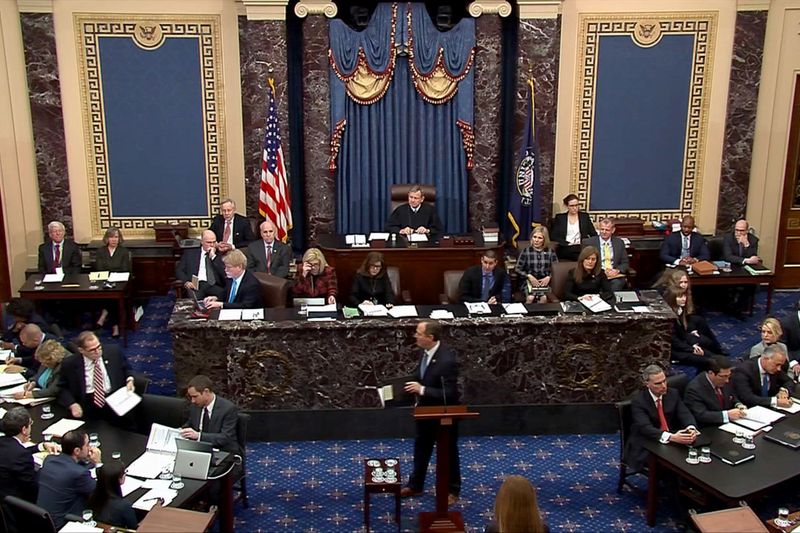By Richard Cowan and David Morgan
WASHINGTON (Reuters) - President Donald Trump's impeachment trial may not result in his removal from office, but it could help determine whether his Republicans retain control of the Senate in the November congressional elections.
For the handful of senators who face tough re-election battles this year, their vote to acquit or convict Trump, or even to call witnesses in the trial, could loom large when voters consider whether to give them another six-year term, analysts said.
Republican strategist James Bowers predicted that the impeachment will play a major role in campaign ads for years.
"We will be seeing the ghost of this impeachment for (election) cycles to come," Bowers said.
Democrats need to pick up four seats from Republicans to win a majority in the Nov. 3 election, in which Trump also will be on the ballot.
The Cook Political Report, Inside Elections and Sabato's Crystal Ball, three nonpartisan election services, estimate that between five and seven incumbent Senate Republicans are at risk of losing their seats, as do two incumbent Democrats.
Democratic political groups are scouring Republicans' media appearances for statements about the trial they think may incense some voters, like saying there is no need to call witnesses. Then they are using these clips on social media to solicit donations for Republican opponents.
Trump was impeached by the Democratic-controlled House of Representatives in December, which alleged he abused his powers and obstructed Congress by pressuring Ukraine to investigate a political rival, former Vice President Joe Biden.
Trump says he has done nothing wrong. His acquittal is seen as likely in the Senate because at least 20 Republicans would have to vote for his removal.
Embattled Republicans like Corey Gardner of Colorado and Martha McSally of Arizona might face a voter backlash if they vote to wrap up the trial quickly, as Republican leaders want, instead of calling for more evidence and witnesses, which could potentially upend the proceeding.
"It could add to their potential problems, if they look like partisan soldiers and not independent, free-thinking senators," said Stuart Rothenberg, senior editor at Inside Elections.
Voting against further evidence would shore up support from Trump conservatives back home, but it could hurt Republicans' chances of appealing to independent voters in states such as Maine, where Republican Senator Susan Collins is hoping to win a fifth six-year term.
Collins already was facing a backlash over her vote for the 2017 tax-cut bill and her 2018 vote to confirm conservative Justice Brett Kavanaugh to the Supreme Court.
Now, the Democratic Senatorial Campaign Committee, which works to elect Democrats, has launched a website to pressure her to vote for more witnesses and evidence, as she did in the 1999 impeachment trial of Democratic President Bill Clinton.
The normally easygoing Collins has bristled lately over trial procedures, after casting several preliminary votes against witnesses and evidence. She said she likely will vote to subpoena witnesses after both sides present their cases.
"This thoughtful approach is what Mainers appreciate most," Collins spokesman Kevin Kelley said.
Gardner has sidestepped the question in Washington and at home in Colorado. A Gardner campaign official said political concerns would not influence his decisions during the trial.
McSally has taken a more confrontational approach, calling a CNN reporter a "liberal hack" after he asked her whether she would vote to see more evidence, and set up a website at www.liberalhack.com to raise money off the incident. An anti-Trump political group then bought www.liberalhack.org to fundraise against her. Her office declined to comment.
Senator Joni Ernst of Iowa, another Republican running hard for re-election, has frequently criticized the Democrats' case for impeachment during breaks in the trial.
Asked by Reuters about Trump's efforts to pressure Ukraine, Ernst said, "He will do what he wants to do. It's probably not the way I would have handled it."
Another vulnerable Republican, North Carolina Senator Thom Tillis, showed no sign of concern earlier this week, telling reporters that he intends to vote for Trump's acquittal.
Most Americans think senators should act as "impartial jurors" during the trial, a Reuters poll released last week found.
However, Patrick Murray, director of the Monmouth University Polling Institute, warned that Democrats risk overplaying their hand because many independent voters did not want to see an impeachment trial in the first place.

"Democrats are taking a big gamble, because it could just as easily go against them," he said.